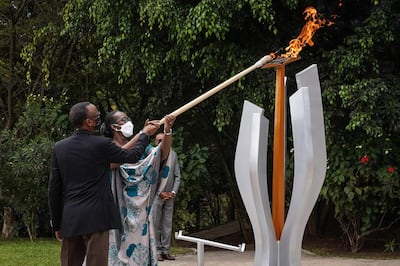France will open its state archives on the genocide of Tutsi in Rawanda to the public, a move aimed at improving relations with the African country and tackling long-held suspicions of French complicity in the carnage.
The move comes on the 27th anniversary of the onset of the massacres and as France released a historical commission report into its actions before and during the killings.
Rwandan President Paul Kagame, whose rebel forces helped end the genocide, welcomed the move as his country commemorated the anniversary.
“It marks an important step towards a common understanding of what took place. It also marks the change, it shows the desire, even for leaders in France, to move forward with a good understanding of what happened,” Mr Kagame said.

Under the leadership of Mr Kagame, relations between Rwanda and France have been strained for years.
About 800,000 ethnic Tutsis, and Hutus who tried to protect them, were killed by Hutu perpetrators over 100 days in 1994.
Rwanda’s genocide commemoration events were curtailed to combat the spread of Covid-19.
Citizens watched on TV as a symbolic flame of remembrance was lit at a memorial.
The annual Walk to Remember was not held and Mr Kagame cancelled a mass gathering at a sports stadium to address a small number of socially distant dignitaries.
The archives cover the activities of former French president Francois Mitterrand and prime minister Edouard Balladur between 1990 and 1994, officials said.
Many of the documents, including diplomatic telegrams and confidential notes, were source material for the long-awaited report by historians on France’s role in the genocide, published late last month.
Mr Macron ordered the report after years of suggestions that France did not do enough to halt the massacres and was even complicit in the crimes.
The commission set up by the president concluded that France bears “heavy and overwhelming responsibilities” for the genocide and was “blind” to preparation for the killings.
The report excluded any “complicity in the genocide” by France. It said there was no evidence of any intention to carry out crimes against humanity, but it was found the French government had failed to appreciate the magnitude of the situation.


